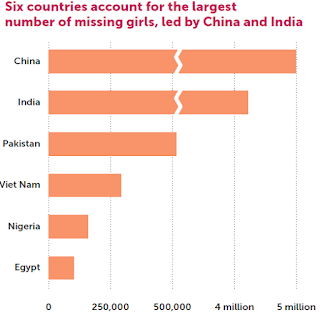India's 48% women victims of partner violence, it ranks 131 of 153 nations in gender index, worst in BRICS
By Our Representative
A fresh report jointly prepared by two of the world’s best known institutes, the Georgetown University’s Institute for Women, Peace and Security (Washington), and the Peace Research Institute (Oslo), has ranked India a poor 131st in its Women Peace and Security (WPS) Index among 153 countries for 2017-18, worse than other competing BRICS (short form for Brazil, Russia, India, China and South Africa) countries, on one hand, and all of India’s neighbours, except Pakistan, on the other.
Measuring WPS index on a scale one 1, the report says, “Overall, the index values range from a high of .886 for Iceland, which leads the world in this first edition of the WPS Index, down to .385 for Afghanistan and Syria, the bottom ranked countries in a tie for last place.”
India’s WPS Index is .580, as against the global average of .662.
Suggesting a huge gap between India’s economic development and gender security, the report says that the country’s the WPS index rank is 27 per cent less than the per capita Gross Domestic Product (GDP) rank.
Giving a detailed account of the WPS ranking and the reason why India ranks so poor compared to peer countries as well as neighours, the data provided by the report show that a whopping 47.7% of women experience lifetime intimate partner violence.
Other figures of equal significance, released by the report, include the mean year schooling of women in the age group 25+ being 5.4, financial inclusion touching 42.6% of women aged 15+, 25% of men aged 15+ agree that it is unacceptable for women to work, and just 29.4% of 25+ women are employed.
A fresh report jointly prepared by two of the world’s best known institutes, the Georgetown University’s Institute for Women, Peace and Security (Washington), and the Peace Research Institute (Oslo), has ranked India a poor 131st in its Women Peace and Security (WPS) Index among 153 countries for 2017-18, worse than other competing BRICS (short form for Brazil, Russia, India, China and South Africa) countries, on one hand, and all of India’s neighbours, except Pakistan, on the other.
Measuring WPS index on a scale one 1, the report says, “Overall, the index values range from a high of .886 for Iceland, which leads the world in this first edition of the WPS Index, down to .385 for Afghanistan and Syria, the bottom ranked countries in a tie for last place.”
India’s WPS Index is .580, as against the global average of .662.
Suggesting a huge gap between India’s economic development and gender security, the report says that the country’s the WPS index rank is 27 per cent less than the per capita Gross Domestic Product (GDP) rank.
Giving a detailed account of the WPS ranking and the reason why India ranks so poor compared to peer countries as well as neighours, the data provided by the report show that a whopping 47.7% of women experience lifetime intimate partner violence.
Other figures of equal significance, released by the report, include the mean year schooling of women in the age group 25+ being 5.4, financial inclusion touching 42.6% of women aged 15+, 25% of men aged 15+ agree that it is unacceptable for women to work, and just 29.4% of 25+ women are employed.
Comments the report, “High levels of gender inequality manifested in son bias”, adding, data on India and China are particularly linked to “their unbalanced sex ratios and the likelihood of conflict.” It cites studies to say, “Youth population bulges in India over 1956–2002 are associated with higher levels of armed conflict, political violence, and Hindu-Muslim riots.”
Azerbaijan and China top the list of 10 countries with the worst son bias, with 116 boys born for every 100 girls, followed by Armenia (114), Viet Nam (112), India and Georgia (111), the Maldives (110), Pakistan (109), and Albania and Papua New Guinea (108).
The report says, “Given the combination of adverse sex ratios and large population size, China (5 million missing girls) and India (4 million) account for the vast majority over the five-year period, followed by Pakistan, Viet Nam, Nigeria, and Egypt”, adding, “Beyond this five year period, the aggregate numbers of missing girls are obviously much larger – estimated on the order of about 66 million in China, for example.”
Azerbaijan and China top the list of 10 countries with the worst son bias, with 116 boys born for every 100 girls, followed by Armenia (114), Viet Nam (112), India and Georgia (111), the Maldives (110), Pakistan (109), and Albania and Papua New Guinea (108).
The report says, “Given the combination of adverse sex ratios and large population size, China (5 million missing girls) and India (4 million) account for the vast majority over the five-year period, followed by Pakistan, Viet Nam, Nigeria, and Egypt”, adding, “Beyond this five year period, the aggregate numbers of missing girls are obviously much larger – estimated on the order of about 66 million in China, for example.”
Regretting that “many countries have not criminalized marital rape, 103 according to the World Bank’s Women, Business, and the Law”, the report says, “Provisions criminalizing marital rape are more common in Latin America and the Caribbean and in countries in the Developed Country group”, but regrets, “No countries in the Middle East criminalize marital rape. In Sri Lanka, marital rape is recognized as a crime only when the spouses are judicially separated.”
As for India, it insists, the country “criminalizes marital rape only when the wife is younger than 15, and Bangladesh does so only when the wife is younger than 13.”
As for India, it insists, the country “criminalizes marital rape only when the wife is younger than 15, and Bangladesh does so only when the wife is younger than 13.”




Comments